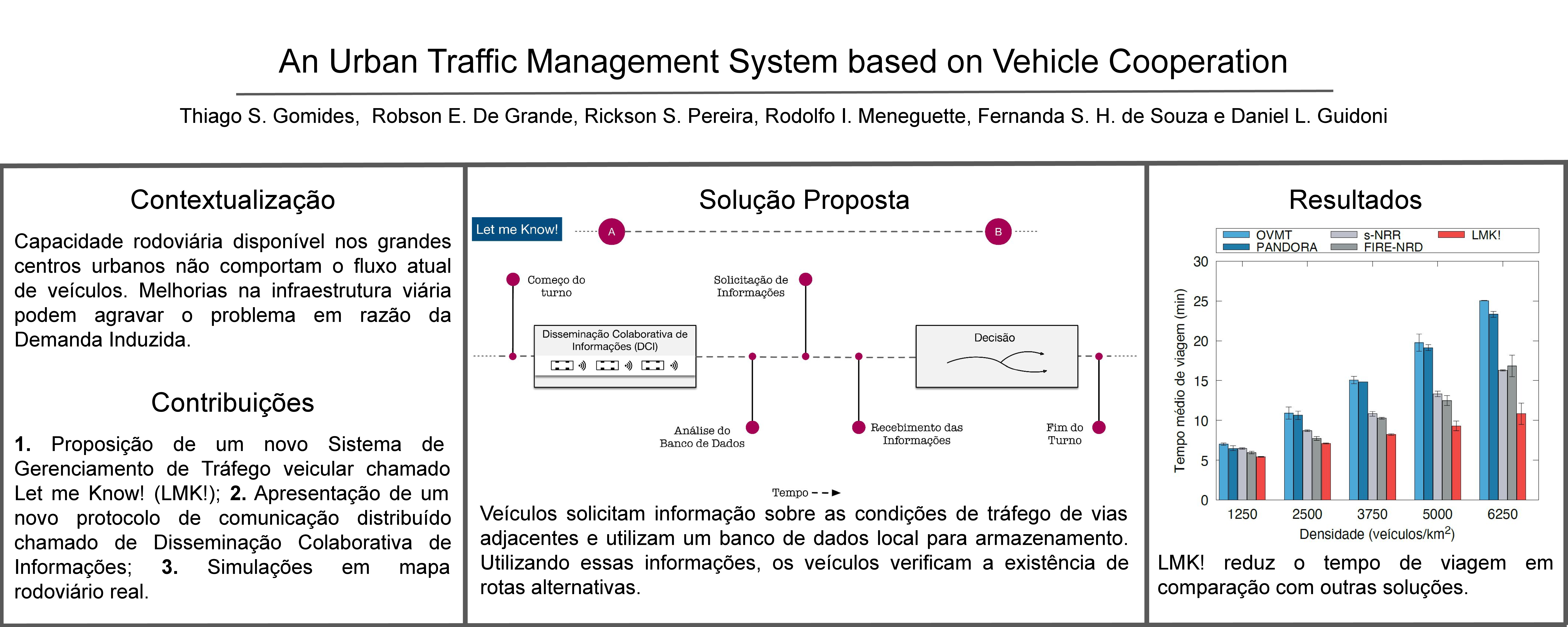An Urban Traffic Management System based on Vehicle Cooperation
Keywords:
Vehicular ad hoc networks, traffic management systems, Traffic Jams, intelligent transportation systemsAbstract
The next generation of smart cities will rely on Intelligent Transport Systems (ITSs) due to the increased complexity and dynamism of traffic caused by continuous urbanization and population growth. The traditional techniques to deal with these challenges are expensive and have a great impact on people's lives and, in this scenario, the introduction of computational and technological solutions is necessary. In order to minimize the problems caused by congestion in urban centers, we present Let Me Know!, a traffic management system inspired by the communication among vehicles that allows the request and availability of information related to vehicular traffic. The vehicles request information in order to update a distributed database containing momentary analyzes of road traffic. Through extensive performance analysis, we show our system's ability to reduce traffic congestion with a low impact on the network.
Downloads
References
J. Speck, Understand Induced Demand, pp. 64–65. Washington, DC:
Island Press/Center for Resource Economics, 2018.
A. Downs, “The law of peak-hour expressway congestion,” Traffic
Quarterly, vol. 16, no. 3, 1962.
S. Djahel, R. Doolan, G. M. Muntean, and J. Murphy, “A
communications-oriented perspective on traffic management systems for
smart cities: Challenges and innovative approaches,” IEEE Communica-
tions Surveys Tutorials, vol. 17, no. 1, pp. 125–151, 2015.
T. S. Gomides, M. L. Fernandes, F. Sumika Hojo de Souza, L. Villas,
and D. L. Guidoni, “Fire-nrd: A fully-distributed and vanets-based traffic
management system for next road decision,” in 2019 15th International
Conference on Distributed Computing in Sensor Systems (DCOSS),
pp. 554–561, May 2019.
D. L. Guidoni, G. Maia, F. S. H. Souza, L. A. Villas, and A. A. F.
Loureiro, “Vehicular traffic management based on traffic engineering
for vehicular ad hoc networks,” IEEE Access, 2020.
T. S. Gomides, R. E. De Grande, A. M. de Souza, F. S. Souza, L. A. Vil-
las, and D. L. Guidoni, “An adaptive and distributed traffic management
system using vehicular ad-hoc networks,” Computer Communications,
vol. 159, pp. 317 – 330, 2020.
U.S Department of Transportation. Federal Highway Admi-
nistration, “Intelligent Transportation Systems (ITS) Program.”
https://www.fhwa.dot.gov/fastact/factsheets/itsprogramfs.cfm, 2022.
M. N. O. Sadiku, N. Gupta, K. K. Patel, and S. M. Musa, An Overview of
Intelligent Transportation Systems in the Context of Internet of Vehicles,
pp. 3–11. Cham: Springer International Publishing, 2021.
H. Yuan and G. Li, “A survey of traffic prediction: from spatio-temporal
data to intelligent transportation,” Data Science and Engineering, vol. 6,
pp. 63–84, 2021.
J. M. Sussman, ITS: A Short History and a Perspective on the Future,
pp. 3–17. Springer US, 2005.
I. J. Cox and G. T. Wilfong, eds., Autonomous Robot Vehicles. Springer
New York, 1990.
H. Shahwani, S. Attique Shah, M. Ashraf, M. Akram, J. P. Jeong, and
J. Shin, “A comprehensive survey on data dissemination in vehicular ad
hoc networks,” Vehicular Communications, vol. 34, p. 100420, 2022.
K. Jurczenia and J. Rak, “A survey of vehicular network systems for
road traffic management,” IEEE Access, vol. 10, pp. 42365–42385, 2022.
S. Wang, S. Djahel, and J. McManis, “A multi-agent based vehicles
re-routing system for unexpected traffic congestion avoidance,” in 17th
International IEEE Conference on Intelligent Transportation Systems
(ITSC), pp. 2541–2548, Oct 2014.
A. M. de Souza, N. L. S. da Fonseca, and L. A. Villas, “A fully-
distributed advanced traffic management system based on opportunistic
content sharing,” in 2017 IEEE International Conference on Communi-
cations (ICC), pp. 1–6, 2017.
T. R. Board, Proposed Chapters for Incorporating Travel Time Reliabi-
lity into the Highway Capacity Manual, ch. 36. Washington, DC: The
National Academies Press, 2013.
B. J. Schroeder, “Part 5 - traffic operations,” in Highway Engineering
(D. J. Findley, B. J. Schroeder, C. M. Cunningham, and T. H. Brown,
eds.), pp. 255 – 432, Butterworth-Heinemann, 2016.
E. Feukeu and T. Zuva, “Dynamic broadcast storm mitigation approach
for vanets,” Future Generation Computer Systems, vol. 107, pp. 1097–
, 2020.
A. Khan, A. A. Siddiqui, F. Ullah, M. Bilal, J. Piran, and H. Song,
“Vp-cast: Velocity and position-based broadcast suppression for vanets,”
IEEE Transactions on Intelligent Transportation Systems, pp. 1–14,
P. A. Lopez, M. Behrisch, L. Bieker-Walz, J. Erdmann, Y.-P. Flötteröd,
R. Hilbrich, L. Lücken, J. Rummel, P. Wagner, and E. Wießner,
“Microscopic traffic simulation using sumo,” in Proceedings of the 21st
IEEE International Conference on Intelligent Transportation Systems,
pp. 2575–2582, IEEE, Nov 2018.
A. Varga and R. Hornig, “An overview of the omnet++ simulation
environment,” in Proceedings of the 1st International Conference on
Simulation Tools and Techniques for Communications, Networks and
Systems & Workshops, Simutools ’08, (ICST, Brussels, Belgium, Bel-
gium), pp. 60:1–60:10, ICST (Institute for Computer Sciences, Social-
Informatics and Telecommunications Engineering), 2008.
C. Sommer, R. German, and F. Dressler, “Bidirectionally Coupled
Network and Road Traffic Simulation for Improved IVC Analysis,” IEEE
Transactions on Mobile Computing, vol. 10, pp. 3–15, January 2011.


